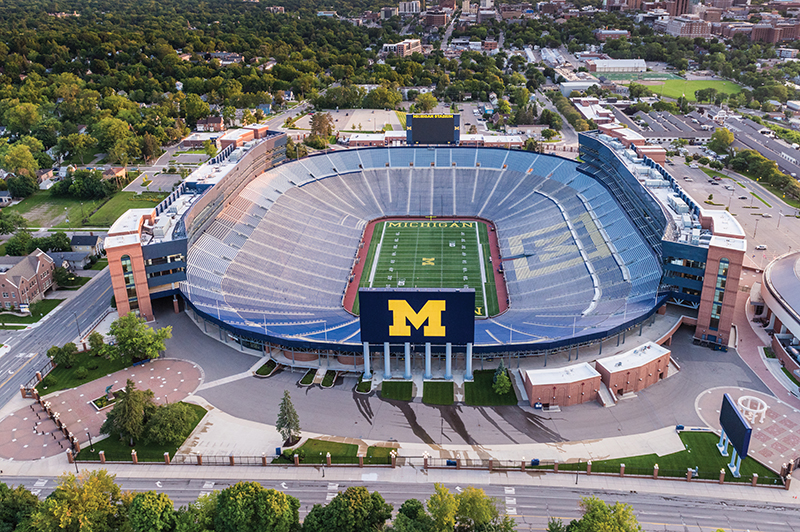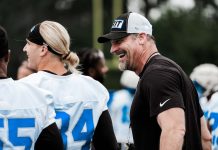
It’s been said there’s no “I” in “team.” But there is one in “pandemic.” And that’s how Jacub Panasiuk found himself alone, lifting eight worn tires dangling from a rod-as-barbell on an Illinois sod patch this spring.
College football players like Panasiuk, a defensive lineman at Michigan State University, may have expected an offseason of highly regimented workouts with bands of brothers in pristine team facilities, underwritten by millions of booster dollars. But this year, the coronavirus pandemic left each man starting in isolation and requiring improvisation, while lacking immunization.
“Still workin” despite the disruption, Panasiuk tweeted, along with a video clip of his lifts.
The ad-lib workout could be a harbinger of a football season where an ongoing pandemic and lack of societal immunity mean the only certainty will be uncertainty and making do may have to do, regardless of what ticket stubs, television schedules, and promotional posters hanging at your favorite pubs from Ann Arbor to East Lansing promise.
Will they play? If so, when, and how? How safe is it to play a game where players swarm over each other? Will players be masked and tested? What happens if a player gets sick? Will there be fans? How many? Who decides? The governor? School presidents? Antibody tests? How does one socially distance in a stadium bathroom line when you (and about a thousand of your closest pals-for-the-moment) really gotta go, now?

The new normal is not only speculative, it’s also situational, with the virus holding the ultimate veto over any plans, at any time. “I’ve used this before. It’s more of a card-playing analogy than political: I said, ‘Hey, this coronavirus thing trumps everything,’” says Jim Brandstatter, the longtime radio play-by-play voice and alum of University of Michigan football, and an East Lansing native. “That’s the reality of it.”
The virus already proved itself as the ultimate sports arbiter when, in just a matter of hours, the Big Ten men’s basketball tournament went from “Hell yeah, game on! Just wash your hands,” to Nebraska’s fever-wracked coach keeling over, to “Sorry, players only. Fans, go home,” to the whole thing getting axed just before U-M was to start its first game.
That’s a script the virus can replicate, easily.
“You think of these scenarios and how everything is going to be OK and they’re getting ahead of it and all that, and then they open up schools. Guys go to school and, say, on the campus of Northwestern they have an outbreak and they have to close Northwestern. Does Northwestern stop football?” Brandstatter wonders.
That sort of moving threat kept campus leaders mulling their fall options well into the summer, and wary about discussing their dilemma right away. “There are still so many unknowns and stuff is constantly changing that we are not able to discuss specifics at this time,” Matt Larson, the associate athletic director for communications at MSU, said via email just as summer school was starting there. Michigan Athletics also took a pass on commenting.

Then again, athletic departments have every reason to be anxious: King Football pays the bills for glitzy facilities, army-sized staffs, and a host of less-visible sports, adding pressure to find some way to play.
“If they don’t play at all, about $100 million is at stake” for each of the biggest schools, like U-M and MSU, says Andrew Zimbalist, an economics professor at Smith College in Massachusetts and a sports industry consultant and author. “When you add together the revenue from the Big Ten Network and national networks and from sponsorships and from ticket sales, … if there’s no season, pretty much all that revenue disappears. If they play a season without fans in the stands, probably they’re looking at $30 to $40 million disappearing.”
In 2018, Forbes reported U-M’s football team alone brought in around $127 million annually to the athletic department through TV deals, ticket sales, sponsorships, merchandise sales, and such, with $75 million of that being used to pay for sports other than football on an annual athletic department budget that’s been nearing the $200 million mark.
And the need for a financially fruitful fall follows a spring where the NCAA governing authority of college sports gave all 300-plus Division I schools like U-M and MSU just $225 million to split among themselves in 2020, a 62.5 percent drop (from an anticipated $600 million) largely driven by the cancellation of men’s basketball’s March Madness, Sports Illustrated reported.
“It’s college football and [men’s] basketball that are the revenue generators,” says Chris Solari, the MSU football and men’s basketball beat reporter for the Detroit Free Press. Many athletic departments lose money, even with football profits at dozens of schools keeping “those nonrevenue minor sports from completely dragging the university down, because they don’t bring the money in.”

Indeed, some smaller schools have already axed some non-revenue sports. Central Michigan University ended men’s track and field in May amid anticipated budgetary shortfalls.
Even if games are played, the Big House probably won’t be a full house, nor will Spartan Stadium. To maintain social distancing, there’s been talk among Gov. Gretchen Whitmer and others about playing games with stands half-filled, quarter-filled, or not filled at all. And fans trying to plan their fall Saturdays have been trying to parse seemingly contradictory statements, like U-M coach Jim Harbaugh’s preference to play in front of no fans, and U-M President Mark Schlissel’s view that if there are no students on campus, there’s probably no football on the field.
If fans find their way in, it could be a very restrained experience. “Where I used to reach around and high-five everyone I could, I probably won’t do that. But to still be there and cheer and enjoy the game and being outdoors, I’d still do it,” says John Snell of Dexter, whose family has held four U-M season ticket seats behind the flagpole in the south end zone since 1978.
But his cousin John Wilber, a retired barkeep from Rochester Hills who also holds U-M season tickets, likely won‚Äôt seat himself amid continued COVID-19 concerns. ‚ÄúThe whole point of a stadium is jamming everybody elbow-to-elbow. I just can‚Äôt take that risk,‚Äù he says.Ã˝
The consequences of a reduced or missed season wouldn’t just be felt around locker rooms and in the stands. There are whole game-day ecosystems that rely on the weekly campus-wide circuses to swell campus town venues — and coffers.

“Football Saturdays get us through the winter. Without them, we’ll have trouble making it through the winter,” says Joe Bell, whose family owns East Lansing’s The Peanut Barrel bar and grill across Grand River Avenue from MSU.
Bell estimates 60 percent of his game-day customers are from out of town. “They’ll come in on Friday, they’ll get into the hotels, they’ll be wherever it is they decided to stay, and then they’ll go out Friday afternoon, Friday night. And then they’ll play all day Saturday, and then on Sunday they’ll get up and find a breakfast joint. … They’ll go to their local sports bar [in their hometowns] if there’s football and there’s no crowds,” Bell says.
Elizabeth Ricciardi can live with that. She makes a couple hundred bucks a game selling knitted hats and sweets from the front yard of her Ann Arbor home along Stadium Boulevard, just a Hail Mary toss away from Michigan Stadium. She wouldn’t mind fall weekends without herds of college football fans that often keep her corralled at home.
But she knows it could really hurt some of her neighbors. “Everybody parks cars on their lawn; everybody’s got a lemonade stand or they bartend on the weekends. My brother works security at the games. Everybody kind of gets their hand in. … I know people who have a whole lawn to park, and if they have a lawn to park, they pay their rent with it,” Ricciardi says. “I know people who do make actual, livable money off of it, so I can see that being a hardship.”
But how much will it hurt? Just like the season itself, we’ll have to let it all play out and see where we are — and were — at the end. Viruses don’t use day planners. MSU’s Panasiuk may have represented the “I” in “pandemic” this spring, but in the fall, each of us with a role in our Saturday showcases will be the “u” in “unsure.”
|
| Ã˝ |
|










